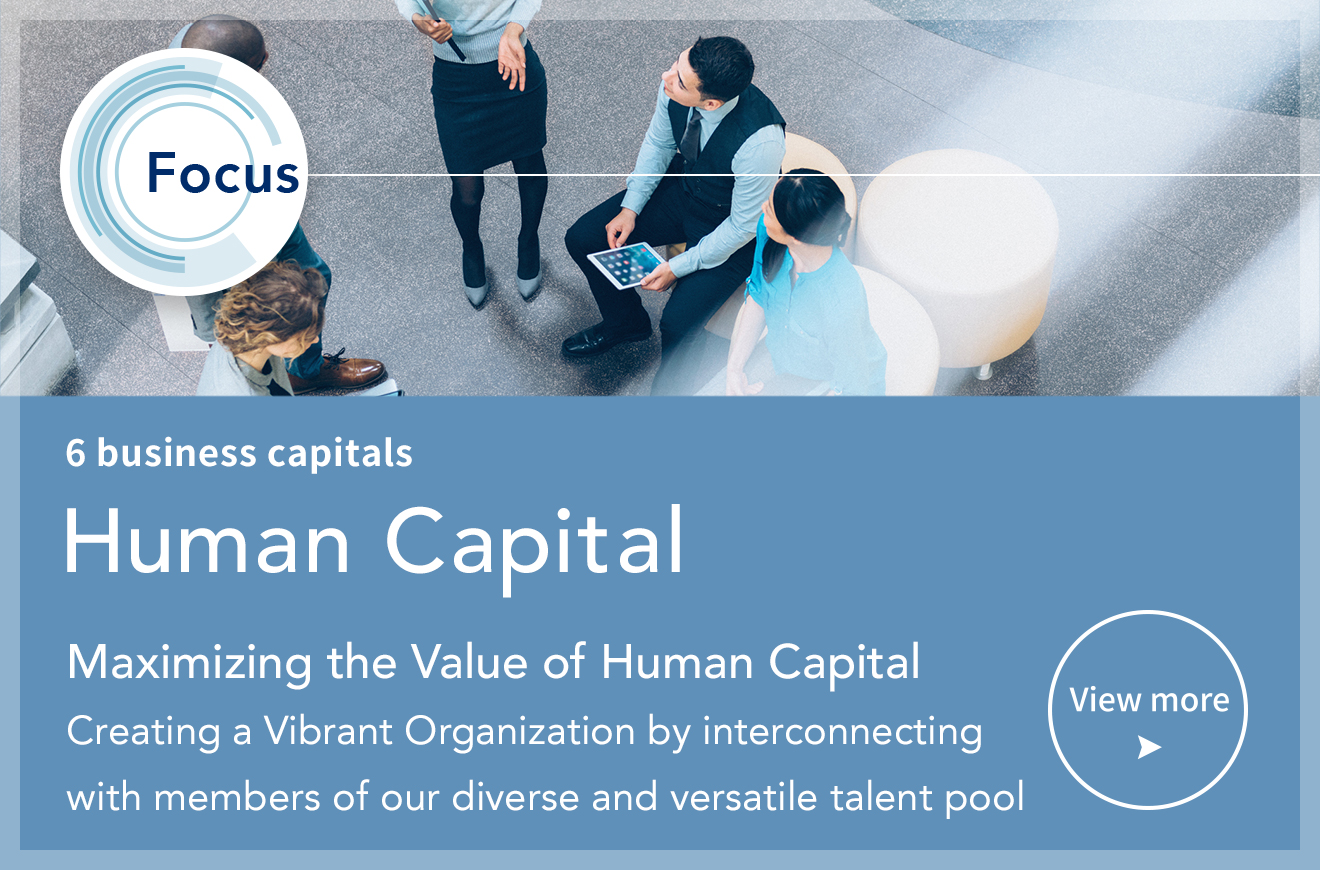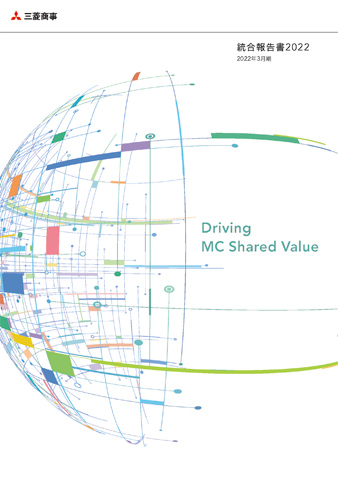Integrated Report 2022PDF List
Index
-
【Introduction】 (PDF:2.2MB)
Index/Editorial Policy/Corporate Philosophy/Message from the President and CEO (PDF:985KB)/Midterm Corporate Strategy 2024/Special Feature Creating a New Future(Fostering New Industries/Regional Revitalization)/Review of Midterm Corporate Strategy 2021
-
【The Value Creation Story】 (PDF:3MB)
Path of Value Creation/Value Creation Process/The Six Capitals/Focus Human Capital—The Source of Value Creation/Materiality/Focus Climate Change—Materiality Forming the Basis of EX Strategy/Message from the CAO (Chief Administrative Officer)/Message from the CFO
-
【Value Creation by the Business Groups】 (PDF:2.7MB)
Business Groups at a Glance/Business Groups × Business Models
-
【Initiatives and Systems Supporting Sustainable Value Creation】 (PDF:2.8MB)
Sustainability Promotion Framework/Risk Management/Corporate Governance
-
【Data Section】 (PDF:2MB)
Directors and Audit & Supervisory Board Members/Executive Officers/Shareholder Information/Organizational Structure/Global Network(Countries and Regions)/Balance of Risk Money Outstanding in 13 Countries/Financial Highlights/Equity in Earnings of Subsidiaries and Affiliates/ESG Data/Corporate Information
The Six Capitals
MC invests the financial and other capitals into its business operations to generate MC Shared Value (MCSV) by addressing societal challenges. The value created then flows back into the capitals, and the increased capitals lead to further value creation.
MC believes that the capitals, which form the foundation of its business operations, can largely be broken down into three types: (1) external capital, which exists outside the company and provides the foundation for societal trust required to carry out business operations; (2) stewardship capital, which the company acquires from external sources and assumes responsibility to increase its value, and (3) internally generated capital, which refers to tangible and intangible assets acquired and created internally by the company using external capital and stewardship capital. We have defined the following six types of capital categorized into each of the above types.
Stewardship Capital
Financial Capital
Receiving financial capital from its providers, increasing its value through business, and distributing the increased value is at the core of any company. In order to continuously increase the value of financial capital, capital efficiency must be improved while maintaining financial soundness. In Midterm Corporate Strategy 2024, we have set a target of double-digit ROE, which we will achieve through careful selection of quality investments and replacing assets using a Value-Added Cyclical Growth Model. With regard to the distribution of financial capital through shareholder returns, we will meet market expectations by combining flexible share buybacks while maintaining stable dividend growth through a progressive dividend scheme.

Human Capital


Human capital is the source of all value creation at MC. Over the years, our diverse and versatile workforce has created value by addressing the various challenges of society, industry and customers and incorporating independent and global perspectives into business creation and execution.
It goes without saying that maximizing human capital requires the development and utilization of talent coordinated with management strategies. In addition, it is important to continue enhancing engagement, because human capital is, by definition, the individual employee who dedicates his or her valuable time to work. In order to further enhance this time for each individual, it is critical to develop a comfortable work environment for employees as an organization which leads to further engagement.
- HR Policies in Midterm Corporate Strategy 2024
-
In order to create MC Shared Value (MCSV) in the current environment of growing uncertainty, we must remain a vibrant organization that responds promptly to management strategies as well as changes in the operating environment, while also maximizing individual capabilities and value. In the HR Policies of Midterm Corporate Strategy 2024, we have established three pillars: HR Strategy, Strengthen Engagement, and Data Utilization. We will continuously strengthen our vision of the ideal organization through strategy execution revolving around these three pillars.
Internally Generated Capital
Business Assets
With its connections in all industries, MC has created new value with a large number of highly competitive and prominent assets in Japan and overseas, including LNG, metals, salmon and trout, and renewable energy.
- Mineral Resources
- MC has a number of excellent assets that are among the world’s best in terms of cost competitiveness and quality. In the copper business, we participate in the management of high-quality copper mines in South American countries such as Chile and Peru, and hold the largest interest in copper production in Japan. In response to the global shift towards decarbonization, the demand for copper, which is essential for electric vehicles (EVs) and offshore wind power, is rapidly increasing, and we are working hard to secure supply. In the metallurgical coal business, Mitsubishi Development Pty Ltd. (MDP) in Australia, which engages in the exploration, development, production and sale of metal resources, is partnered with BHP in the BMA metallurgical coal business, which holds approximately 30% of the world’s maritime trade volume.
- LNG
- We have LNG operations all over the world, including in North America, Southeast Asia, and Australia, and we maintain a market presence as the largest LNG operator (based on production share) in Japan. We are responsible for providing a stable supply of energy while working to address environmental challenges such as climate change and air pollution.
- Salmon and Trout
- In 2014, we acquired Cermaq, one of the world’s leading salmon farming, processing and sales companies producing approximately 200,000 tons of salmon annually in Norway, Chile and Canada. This acquisition was made against a backdrop of growing demand for marine products driven by global population growth and an increasing interest in sustainable supply, focusing on the importance of supporting the sustainable growth of fisheries. With this acquisition, MC became the world’s second largest producer of farmed salmon.
- Renewable energy
- We are actively engaged in all aspects of renewable energy, from development to construction, financing, and operation. Within the renewable energy businesses, we have a strong track record in development, construction and operation, especially in the offshore wind power generation and undersea power transmission businesses. Including our equity share in Dutch integrated energy company Eneco, an investment we made in March 2020, we hold a renewable energy power generation capacity of approximately 3.5 million kW as of the end of March 2022.
Intelligence and Industry Expertise
As MC engages in a global network of business operations across all regions and industries, we have accumulated intangible assets such as “intelligence” and “industry expertise”.
- Intelligence
- Through the efficient and effective division of functions among our head office, global offices and subsidiaries, and group companies, we are constantly collaborating to enhance our ability to respond to change and generate the next source of significant growth. Through this global network developed over many years, we possess multifaceted intelligence and know-how in macroeconomics, industry and geopolitics. In order to connect this diverse intelligence and further strengthen our ability to respond to the external environment, we have newly established the Global Intelligence Committee (GI Committee) in Midterm Corporate Strategy 2024. By incorporating the analysis of the GI Committee into the MC Shared Value Forum (MCSV Forum), which discusses and formulates cross-industry companywide strategies, we will strengthen the driving force of our Business Groups and collaboration across all industries.
- Industry Expertise
-
We have maintained connections with all industries for many years, and have accumulated industry expertise and know-how, by diving deep into each industry and developing a wide range of businesses. Each Business Group will strengthen the driving force of its business in each industry, and will work to provide new value by combining this physical frontline field of operations with digital technology, thereby further enhancing industry expertise.
External Capital (Foundation for Societal Trust)
Social Capital
To implement our business operations, we need to ensure that their value and significance is widely recognized not only by our customers and partners, but also by stakeholders with whom have no direct contractual relationship. In addition to shareholders, investors, creditors, and employees, who provide the human capital, we regard our customers, partners, local communities, NGOs, governments and government agencies as our principal stakeholders, and we continuously engage both pillars to ensure business continuity. Through this engagement and our connections with diverse stakeholders and by returning the generated value appropriately, we continue to promote the circulation of value throughout society as a whole.

- Customers and Partners
- MC will contribute to the development of societies and economies by providing a stable supply of products and services that meet the needs of customers and business partners across a wide range of business areas, from upstream raw material procurement to downstream retail. This will be done by working with our customers and business partners to develop various businesses that could not have been realized alone. Moreover, as a company that handles a diverse range of products and services worldwide, MC is working to achieve a sustainable supply chain as a key issue.
- Local Communities
- MC believes in the importance of “Growing Together with Local Communities” and “Addressing the Needs of Society through Business Innovation” as well as the value of building relationships with communities for the success of its businesses. Furthermore, by growing together with communities through job creation, promoting community development and procuring raw materials from local communities, MC also strives to minimize negative impacts, including by respecting the rights of indigenous peoples. Particularly for large-scale projects where the understanding and cooperation of local communities is crucial, we hold public hearings and dialogues with local residents as needed. Growing together with local communities is equally as important as advancing our businesses and generating financial return. This represents the true spirit of MC, which seeks to simultaneously generate economic, environmental and societal value.
- Governments and Local Authorities
- To achieve improvements and provide solutions to societal issues through our global business operations, we engage in collaboration, joint initiatives and dialogue with government and public organizations through our involvement in business associations, public-private sector initiatives and other forums, with the aim of contributing to societal development.
- NGOs
- We recognize NGOs as key stakeholders that function as representatives for the planet and its citizens, and we seriously consider the opinions and concerns raised through our robust communication on a day-to-day basis and seek their views to improve our initiatives. Moreover, we are promoting collaborations with NGOs to address environmental and societal challenges.
Environmental and Natural Capital
As with social capital, consideration for the environment and nature is also an indispensable element in maintaining the foundation of societal trust critical to business continuity, and we recognize the Earth as our greatest stakeholder. In order to continuously create MCSV in accordance with the aims of Midterm Corporate Strategy 2024, we have identified the following as part of our Materiality, or important societal issues to be addressed through our business: “Conserving and Effectively Utilizing Natural Capital”, in which we strive to maintain biodiversity and conserve natural capital while reducing our environmental footprint and realizing a circular economy, and “Contributing to Decarbonized Societies”, in which we provide products and services that contribute to decarbonization during the transition period. Using our Materiality as a guideline, we will continue to strengthen our efforts for sustainable growth.






